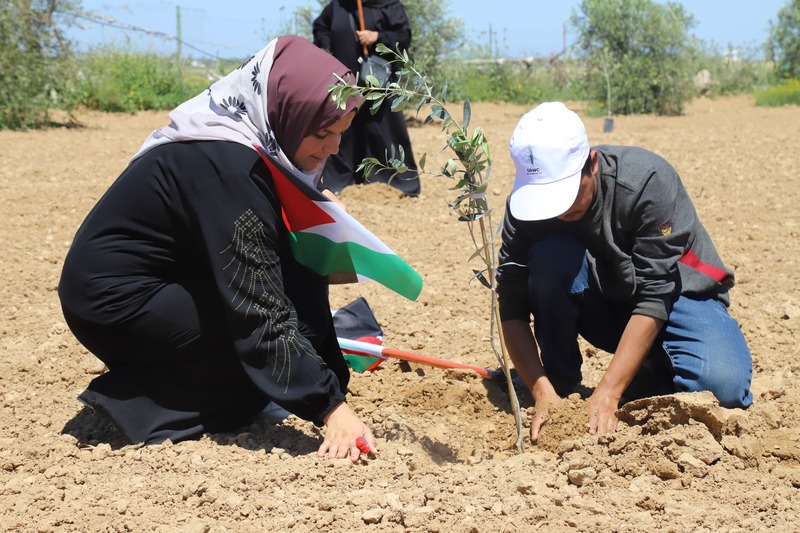Israel’s retaliation for the 7 October 2023 attack by Hamas has rapidly evolved into another phase of what can only be considered a genocidal campaign to destroy and displace the 2.2 million residents of Gaza. As this article goes to publication (October 27, 2023), indiscriminate aerial bombings by the Israeli army have killed over 7,000 people in Gaza, most of them women and children, and obliterated over 200,000 housing units, as well as schools, hospitals and religious centres. Israel has cut Gaza off from essential supplies of food, water, fuel, electricity and medicines for over two weeks now, creating, according to the WHO “a humanitarian and health crisis that has reached catastrophic proportions.
Even before this latest escalation of violence, the people of Gaza were already in a humanitarian crisis. Since 2007, Israel has been imposing an illegal blockade on the territory, forcing 77% of its residents to depend on food aid. Today, organisations from La Via Campesina to Oxfam say that starvation is being used as a “strategy of war” by the Israeli government.
Since decades, one of the many dimensions of Israel’s colonial project has been the destruction of Palestinian agriculture and fishing. Prior to October 2023, 35% of Gaza’s farmland lay within an “access restricted area” on the border with Israel. As a result, 113,000 farmers lost access to their lands located in this area. Furthermore, since 2014, Israeli crop duster planes have been systematically spraying herbicides, including glyphosate, during harvest periods, often when the wind blows towards Gaza. In January 2020 alone, this spraying damaged 281 hectares of Palestinian crops, affecting 350 farmers and causing a loss of over US$ one million.
Israel’s apartheid regime has turned fishing in Gaza – a livelihood deeply ingrained in the local culture and economy – into one of Palestine’s most precarious and dangerous occupations. Fuel shortages and a lack of equipment, due to restrictions on the entry of goods to Gaza, make going out to sea difficult. Fisherfolk venturing beyond the designated 6 nautical miles often face imprisonment or direct gunfire by Israelis. This is in contravention of international law which allows the Palestinian State to claim permanent sovereignty within 60 nautical miles. As a result, only half of the 3,800 registered Gazan fishers have the possibility to pursue their work, ultimately affecting 35,000 people who depend on the sector for their livelihoods.
In the West Bank, Israeli settlers have taken advantage of today’s offensive in Gaza to step up their own violent attacks to grab more land, displacing hundreds of Palestinian farmers. Again, this is a strategy that has been used for years. The West Bank is 90% farmland, yet a substantial portion of it has been under direct Israeli control since the Oslo Accords of 1993. A separation barrier, mostly situated within the West Bank, has been significantly hampering access to land for thousands of Palestinian farmers by dividing farm and pastureland from their villages. In 2019, only 12 of the 76 gates designated to allow access to farmers opened daily, while 56 of them required permits. Added to that, the apartheid system pushes Palestinian farmers into using seeds and agrochemicals sold by Israeli companies, thereby destroying their soils and biodiversity and leaving them in debt and poverty. This has led to a significant decline in farming, a sector historically vital to Palestinian society and identity.
Even before the most recent cuts to basic services in Gaza, the situation for Palestinians was already dire. In terms of access to water, the Israeli government has imposed severe constraints, which the human rights organisation Al-Haq calls “water apartheid”. Since 1982, Palestinians have depended on Israel for their water supplies, as the national water company, Mekorot, controls infrastructure. Israel’s extraction of water from aquifers in the West Bank accounts for 85% of the country's supply. While Mekorot ensures the connection of illegal settlements to the water network, permits for Palestinians to construct new water wells are constantly denied and their rainwater harvesting cisterns are often destroyed by the Israeli army. This underlying discrimination is starkly evident when you consider that in the West Bank, Israeli settlers consume in average over six times more water than Palestinians.
The consequences of this water apartheid extend beyond agriculture, affecting health as well. Waterborne diseases have become the leading cause of death in Gaza due to water shortages in the towns and villages, as well as the lack of access to running water in rural communities. But the control of water also means the capacity to regulate dams. The Al Mezan Center for Human Rights reports that the manipulation of rainwater dams or water barriers by Israeli authorities has caused sudden floods over cultivated lands in Gaza.
Peasant organisations and those defending food sovereignty have developed a range of responses to these difficult conditions. These take the form of Gazan women’s solidarity marketing and dignity baskets, to local seed banks, to agroecological farming. Given the risk of criminalisation and repression they and other groups face from Israel, it is important to recognise and support these initiatives.
Gaza is facing a situation that, far from being a war between armies, is more akin to the destruction of an entire population. The purpose seems clear: to take control of all Palestinian territory, this time more overtly and through an exponential increase in violence. It is something Israel has been pursuing systematically and with impunity since 1948, when 750,000 Palestinians were forcibly displaced. That is why it is so crucial to keep up collective pressure to call for an immediate ceasefire, as well as an end to the apartheid regime. Palestinian people, farmers and fisherfolk have the right to regain sovereignty over their lives and their land.
Photo: UAWC - La Via Campesina
Source:https://grain.org/e/7046

















































Yorumlarınızı Bizimle Paylaşın
Sadece üyelerimiz yorum yapabilir, hemen ücretsiz üye olmak için Tıklayın